How Can We Help?
5.10.15.10.1
We are pleased to announce that version 5.10.1 (4.29.1) of Pure is now released
Always read through the details of the release before installing or upgrading to a new version of Pure
Release date: 7 November 2017
Hosted customers:
- Staging environments (including hosted Pure Portal) will be updated 8 November 2017 (APAC + Europe) and 9 November 2017 (North / South America)
- Production environments (including hosted Pure Portal) will be updated 8 November 2017(APAC + Europe) and 9 November 2017 (North / South America)
Be aware of the Upgrade Notes - failing to adhere to these may result in loss of functionality
Content validation
You are generally encouraged to check all content in the re-validation workflow step prior to upgrade as changes to the underlying datamodel may not be reflected in the re-validation overview screen (see example)
Further, you are encouraged to check if all content can validate prior to an upgrade of Pure. This check is done by running the Check content and files job and resolving any data validation issues that are flagged by the job
Installation and downloading
See the Request Pure distribution file page for information about how to request a new version of Pure
Other Resources and Links
If you have problems with this release please contact Pure Support to get help
Pure hosting requirements
See the Pure Requirements page for more information about the current hosting requirements for Pure
1. Reporting
As we continue building out the full feature set in the Reporting Module technology preview, this release includes some new features.
1.1. Split functionality
This release includes the delivery of a new 'Split' function in reporting that will enable you to easily split a single column into segments (e.g. Publication year, Output type, Workflow step).
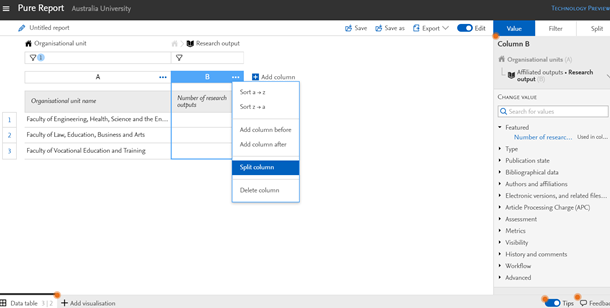 |
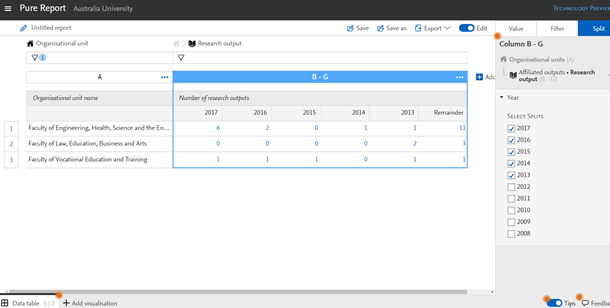 |
Splits available in this release include:
Persons |
Research Outputs |
Organisations |
Journals |
|---|---|---|---|
|
|
|
|
Notes:
- Where not all available segments are selected, a 'Remainder' column will be calculated to ensure that you continue to see the full picture, rather than inadvertently applying a filter on the content
1.2. ERA2018 content (Australia) : Improvements
With the ERA2018 submission deadline fast approaching, we are continuing to expand the ERA2018 content types available in the new Reporting module to help users accurately and easily report on ERA2018 data.
This release includes the facility to report on content at the Field of Research level, with metrics available for relevant ERA content:
- Apportioned number of ERA Researchers
- Apportioned number of ERA Research Outputs
- Apportioned number of ERA Portfolios
- Number of ERA Research Outputs nominated for Peer Review
- ERA Research Income associated with the FoR
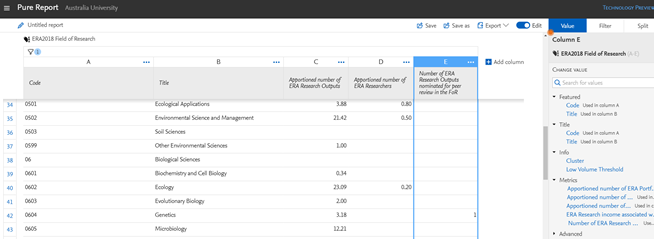
2. Australia : ERA2018 module
2.1. ERA Dark Repository
In this release, we have updated the ERA Dark Repository functionality as per the new ERA2018 requirements (namely, we no longer offer a landing page, but rather each link goes directly to the electronic version uploaded (and where there are multiple electronic versions, multiple links are provided)).
Details of this functionality are available here .
Note that the logic deriving the 'Available in Open Access repository' flag on the ERA Research Output record is still to be updated to ensure we are accurately flagging OA outputs as per the ARC's OA policy. This will be resolved in an upcoming release.
2.2. Other improvements
We have also made the following improvements in the ERA2018 module:
- Updated the ERA Research Output Profile screen to accurately capture Portfolios
- Updated the ERA Peer Review : Monitoring screen to appropriately capture 'Research report for an external body' in the Non-traditional output sub-totals
- Improved the use of ERA Research Output warnings (e.g. Output not published during ERA reference period, Output does not meet 66% re-assignment exception, etc.) to ensure consistency across the various ERA screens and editors
- Updated the following ERA Researcher values as per the submission requirements:
- Employment status
- Employment level (and we plan to offer a job to edit these in bulk in a future release) (the ERA2018 Researcher import job has also been updated to accept the new values)
- Note that the 'Other' classification still exists if you had any existing ERA Researchers assigned to this level. You will need to edit these records to ensure that they pass SEER validation. The 'Other' classification will not be available for selection when creating new ERA Researchers.
- Researcher function
- Fixed a recently introduced bug to ensure the ERA Research Output 'Reassignment exception' filter works again
- Improvements to reporting on ERA2018 content in the new Reporting module technology preview - see details above.
- We have also delivered improvements to reporting on ERA2018 content in the 'classic' Reporting module, namely that when reporting on FoR, it is possible to just get out the code on its own, without the name:
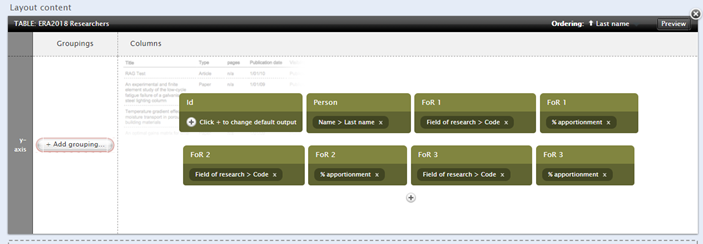 |
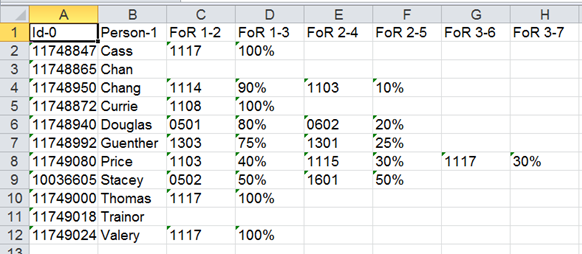 |
Further details are available in the ERA2018 wiki.
3. UK : REF2021 module
3.1. REF2021 UoAs updated
As per the published Initial Decisions, we have updated the Units of Assessment for REF2021.
Notes:
- Engineering:
- Any content assigned to 'old' UoAs 12, 13, 14, and 15 (the old Engineering UoAs) will be migrated to the new UoA 12 Engineering
- Where Research Groups existed in the 'old' UoAs, these have been migrated to the new UoA 12 as follows:
- All existing Research Groups will be migrated (this may mean new Research Group codes (i.e. A, B, C, ...) will be assigned)
- If any Research Groups had exactly the same name, they will be merged into a single Research Group (e.g. UoA 13 A : Materials and UoA 14 C : Materials will merge into a single Materials research group in UoA 12)
- If any of the 'old' UoAs had "Are individuals permitted to be assigned to more than one research group" set to YES, then the new UoA 12 will have "Are individuals permitted to be assigned to more than one research group" set to YES
- If any of the 'old' UoAs has "Disable Research Group on REF2" set to NO, then the new UoA 12 will have have "Disable Research Group on REF2" set to NO
- Geography, Environmental Studies and Archaeology:
- Any content assigned to 'old' UoA 17 (Geography, Environmental Studies and Archaeology) will be migrated to the new UoA 14 Geography and Environmental Studies (any content you wish to submit to UoA 15 Archaeology will need to be moved manually).
- All other UoAs will simply migrate to the new UoA name / number, where this has changed
- Exact details of the REF2014 UoAs to REF2021 UoAs mapping in Pure is available here
Published at February 13, 2024
